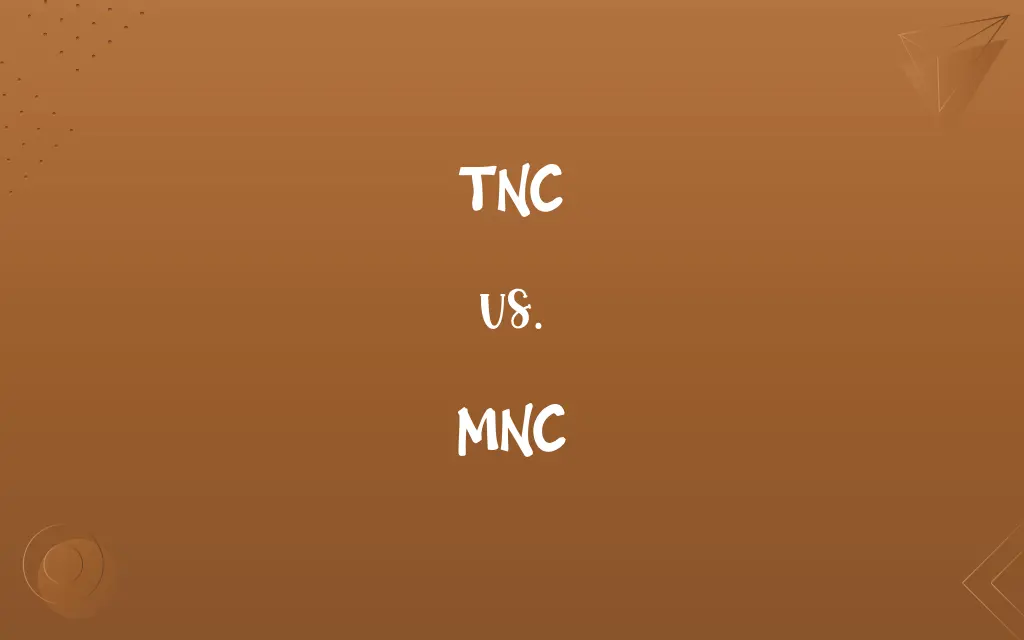TNC vs. MNC: Know the Difference
A Transnational Corporation (TNC) operates globally without being identified with a home country, whereas a Multinational Corporation (MNC) has facilities and assets in multiple countries but maintains a clear home base.

Key Differences
TNCs often operate in a way that transcends national boundaries, implying a global approach to their business strategies and decision-making. MNCs, while also operating in multiple countries, have a more defined national identity and headquarters.
TNCs typically exhibit a more fluid and integrated global structure, emphasizing a worldwide perspective in their operations. MNCs usually have a more centralized structure with subsidiaries in various countries that report back to the main office.
TNCs tend to adopt a more global corporate culture, blending practices from various regions. MNCs often maintain their core corporate culture from the home country, adapting as needed for local operations.
TNCs might have a significant impact on global economics, often operating with considerable independence from any single national economy. MNCs, while also influential, are more closely tied to their home country's economic conditions and policies.
TNCs face unique challenges in political and legal identity, as they transcend national borders and may not be closely identified with any one country. MNCs are usually identified with their home country, facing international operations' legal and political challenges.
ADVERTISEMENT
Comparison Chart
National Identity
Global, less tied to a home country
Strong home country identity
Organizational Structure
Fluid, integrated globally
Centralized, with subsidiaries
Cultural Approach
Global blending of practices
Core culture from home country
Economic Ties
Independent from single national economy
Closely tied to home country's economy
Political/Legal Identity
Challenges in defining national ties
Identified with home country's legal system
ADVERTISEMENT
TNC and MNC Definitions
TNC
Global Business Entity
This TNC operates in over 30 countries.
MNC
International Presence
Their MNC status gives them a strong global presence.
TNC
Flexible National Identity
As a TNC, they are not strongly identified with one country.
MNC
Operates in Multiple Countries
This MNC has subsidiaries in various nations.
TNC
Integrated International Structure
Their TNC structure integrates operations across continents.
ADVERTISEMENT
MNC
Economic Ties to Home Country
The MNC's performance affects its home country's economy.
TNC
Worldwide Operations
Their TNC status allows them to impact global markets.
MNC
Adapts to Local Markets
As an MNC, they tailor their products for each region.
TNC
Transcends National Borders
The TNC's strategy is not limited by national boundaries.
MNC
Headquarters in Home Country
The MNC's main office is located in its country of origin.
Repeatedly Asked Queries
What defines a TNC?
A company operating globally, often without a strong national identity.
What is a key feature of an MNC?
Having facilities and assets in multiple countries with a clear home base.
What distinguishes an MNC's structure?
A centralized structure with overseas subsidiaries.
How do MNCs manage cultural differences?
By adapting their home country's culture to local operations.
Do MNCs rely on their home country's economy?
Yes, they are closely tied to it.
Do TNCs adapt to local cultures?
They blend various regional practices into a global culture.
How does a TNC view its market?
It views the world as a single, integrated market.
Do MNCs have a global or national focus?
They focus on international expansion while maintaining a national identity.
How do MNCs benefit their home country?
By contributing to the home country's economy and international trade.
Can a TNC influence global economics?
Yes, significantly and often independently.
How do TNCs handle political identity?
They often face challenges due to their lack of strong national ties.
Is it easier for TNCs or MNCs to enter new markets?
TNCs often find it easier due to their global approach.
Do TNCs prioritize global or local interests?
They tend to prioritize global interests.
Are TNCs more diverse than MNCs?
Typically, due to their broader international integration.
Are MNCs affected by their home country's politics?
Yes, they are usually influenced by their home country's legal and political environment.
What challenges do TNCs face in global operations?
Cultural, regulatory, and logistical complexities.
How do MNCs handle global competition?
By leveraging their international presence and resources.
Can an MNC transform into a TNC?
Yes, by adopting a more globalized and less nationally tied approach.
What legal issues do TNCs face?
Complex issues due to operations in multiple legal jurisdictions.
Can MNCs be considered local companies abroad?
In some cases, they adapt sufficiently to be seen as local entities.
Share this page
Link for your blog / website
HTML
Link to share via messenger









































































